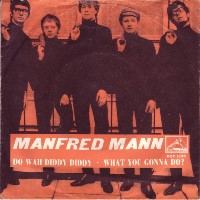
Zabadak, Da Do Don Don, De Do Do Do, De Da Da Da, Ob-La-Di, Ob-La-Da and Do Wah Diddy Diddy are just a small handful of completely nonsense song titles that became big hits around the world, but the songs themselves are not as meaningless as you may think. Do Wah Diddy Diddy went to number one both in the UK and the USA for Manfred Mann, but it was a cover. Let’s find out about the original, who wrote it and what it’s really about.
Like The Rolling Stones, Manfred Mann was formed by musicians who would frequent the London jazz and R&B clubs. The band, named after its leader, Manfred Mann, who had come from South Africa and played keyboards, consisted of Paul Jones (lead vocals, harmonica), Mike Vickers (guitar and saxophone), Tom McGuinness (bass) and Mike Hugg (drums)
They opened their UK chart account with the self-penned 5-4-3-2-1, which later became the theme tune to ITV’s Ready, Steady, Go!, but most of their hits were cover versions of American songs. Manfred says, “We weren’t great songwriters and we knew we had to have great songs. The Beatles, The Rolling Stones and The Kinks all had wonderful, original songs, but we succeeded through a sense of judgement. The Hollies were in the same position as us.”
In 1963 the Brill Building songwriters, Jeff Barry and Ellie Greenwich, had written Da Doo Ron Ron for The Crystals and it’s easy for any songwriter to stick to a winning formula and, as Ellie Greenwich said, “We thought we would write another song like that and came up with Do Wah Diddy Diddy. The Exciters, who had just had a hit with the original version of Tell Him, recorded it but it never made it. Jeff and I were about to record it ourselves as The Raindrops when we heard that Manfred Mann had released it in England.” My 1000 UK Number Ones Book co-author, Spencer Leigh told Ellie, “Do Wah Diddy Diddy is now performed by The Manfreds in a 10-minute audience workout. ” to which she replied, “That’s great”, adding, “I look at Da Doo Ron Ron and Do Wah Diddy Diddy as nursery rhyme songs. Everybody of every age can sing them because they are so easy to remember.”
It’s likely that Paul Jones, thought the same because their second hit, in April 1964 was Hubble Bubble (Toil And Trouble) which sounded like a kids phrase from a nursery rhyme but which actually is a rhyming couplet from Shakespeare’s play, Macbeth. Jones chose many of the songs the Manfreds were to cover, he said to me, “We were working our way through my record collection. I had Do Wah Diddy Diddy by The Exciters, Sha La La by The Shirelles, Oh No Not My Baby by Maxine Brown and Come Tomorrow by Marie Knight. I always had something that we ought to do. I loved The Exciters’ version of Do Wah Diddy Diddy – what a great song and what a great euphemism for sexual dalliance.”
The only thing Paul did was change the gender with the opening line being, ‘There she was just a-walkin’ down the street, singin’ do wah diddy diddy dum diddy do,’ whereas the Exciters sang ‘There he was just a-walkin’ down the street, singin’ do wah diddy diddy dum diddy do’.
The song tells a story of a man walking down the street and is instantly captivated by the woman coming towards him. The tempo of the song lets you sense his excitement, she was so good looking that he nearly lost his mind. The next minute they are walking together, hand in hand both singing the title. Highly unlikely, I know. By the third verse, we learn that they are together ‘nearly every single day’ revealing that marriage is on the cards.
So, although we don’t learn in the song that they actually got married, we have to assume they did and all this happened in the two minutes and 19 seconds of the song. I was brought up believing you didn’t hurry these sort of things back then.
When Greenwich first heard the Manfred’s version she was miffed expressing one particular reservation, “I was an English major, and when he sang, ‘I knew we was falling in love’, I don’t think so!” she said in the documentary The Teens Who Stole Pop Music. But she did quickly realise it could be a good omen saying, “We thought, with the British Invasion, maybe this is a lucky charm, and it sure was.”
The song has been covered by numerous acts including Jan & Dean, Reparata and The Delrons, The Foundations, Andrew Gold, Showaddywaddy, Black Lace and even Neil Diamond. It also featured on a 1980 episode of The Muppet Show, where it was performed by a group of elderly rock ‘n rollers known as Geri and the Atrics.
Manfred Mann had two further UK chart-toppers with Pretty Flamingo in May 1966 and then, with new vocalist, Mike D’Abo, Mighty Quinn in March 1968. Paul Jones went on to host a blues show on Radio Two for over 30 years and still performs regularly in his other incarnation as The Blues Band which he formed in 1979 and featured some members of The Manfreds. If you do catch them, you may hear them perform a different blues song by Blind Blake from 1929 called Diddy Wah Diddy.